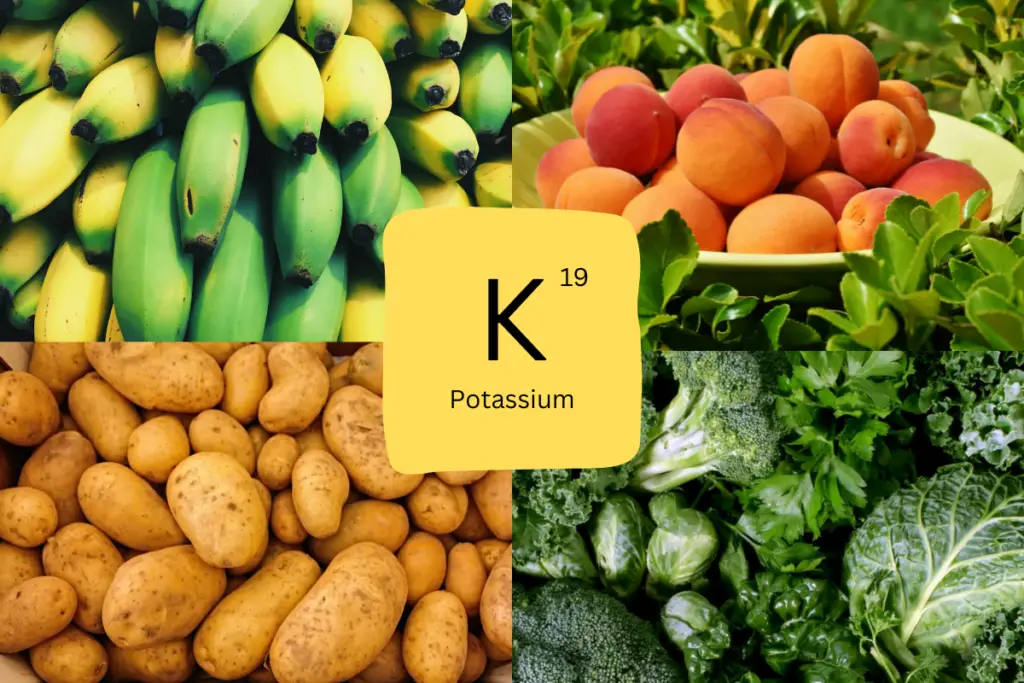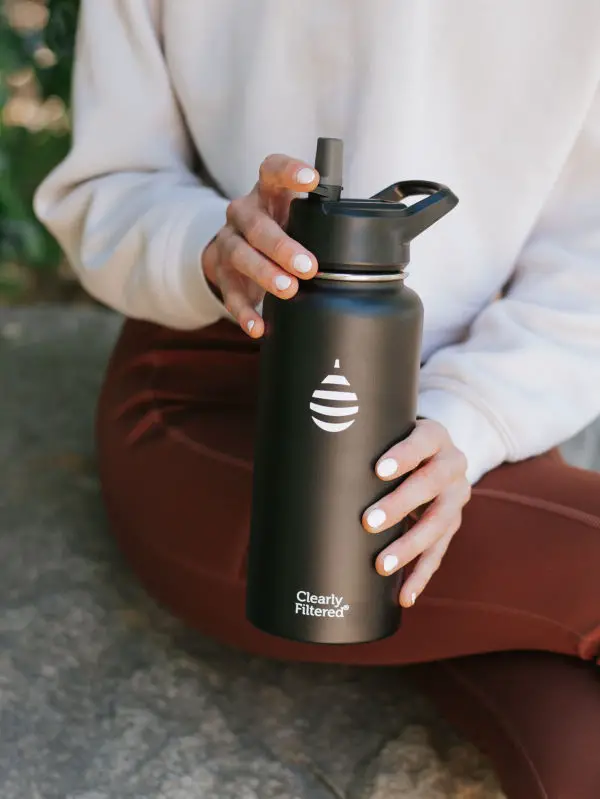An essential mineral and electrolyte, potassium in sparkling water can benefit your health in many ways. This especially serves true if consuming a Westernized diet limited in potassium-rich fruits and veggies, as well as quenching thirst with sugary drinks instead of hydrating water.
Sparkling water, also known as carbonated water, has namely been infused with carbon dioxide gas. Whether artificially added or naturally occurring, potassium is often in sparkling water, along with other minerals.
Ahead, learn the specific advantages of potassium in sparkling water and any potential risks. Also discover potassium concentrations in popular sparkling water brands, so you can be a confident consumer!
- Potassium in sparkling water is an essential nutrient and electrolyte that can boost your daily intake of minerals and improve hydration.
- People with hyperkalemia or chronic kidney disease may need to avoid drinking sparkling water high in potassium.
- Increased dietary potassium intake may help prevent hypertension, kidney stones and heart disease.
Is Potassium in Sparkling Water Good for You?
Potassium is an essential nutrient, meaning the body does not produce any or enough of it to support good health. Instead, essential nutrients like potassium must be obtained from the diet.
Functioning as an electrolyte and mineral, potassium is critical for carrying out normal functions of all the body’s cells. Potassium is especially important for maintaining fluid balance, as well as:
- Regulating blood pressure
- Transmitting nerve impulses
- Influencing cardiac activity
- Impacting neuromuscular functions
Balancing and increasing potassium intake may also protect from many health conditions such as:
- Hypertension (high blood pressure)
- Stroke
- Kidney stones
- Cardiovascular/heart diseases
- Reduced bone density and osteoporosis
- Associated morbidity (rate of diseases) and mortality (death) risks
Although, despite the health advantages, too much potassium can negatively impact health. Known as hyperkalemia, high potassium levels in the blood can cause abnormal heart rhythms and even be life-threatening.
Fortunately, hyperkalemia is rare just as a potassium deficiency is. However, certain factors can increase your risk of hyperkalemia, such as:
- Kidney disease and renal failure (discussed in greater detail below)
- Diabetes complications, mostly due to decreased insulin
- Adrenal disease
- Increased tissue breakdown, including major burns and rhabdomyolysis
- Chronic potassium supplement intake
Knowing and limiting sources of potassium is important, especially if you are at greater risk of developing hyperkalemia.

Bananas, potatoes, leafy greens, and other plant-based and wholesome foods naturally source potassium, although unlikely culprits include sparkling water and water flavor enhancers.
Also read about water flavor enhancers without potassium here.
Is sparkling water high in potassium?
While sparking water often contains potassium, concentrations are not overly high. Although, potassium content in sparkling water varies between brands and geographic locations.
Sparkling Water Brands
Potassium content in popular and commonly consumed brands includes the following – denoted as milligrams per liter (mg/L) unless otherwise stated:
- Gerolsteiner Sparkling Mineral Water – 1% of the daily recommended intake
- Perrier Sparkling Mineral Water – Not detected at or above the Minimum Reporting Limit
- Poland Spring Sparkling Water – Not detected at or above the Minimum Reporting Limit
- San Pellegrino Italian Sparkling Drinks – 2.1 mg/L (<1% of the daily recommended intake)
- Topo Chico – 3.6 mg/L (<1% of the daily recommended intake)
- Voss Sparkling Water – Not detected/below lower detection limit
Geographical Locations
As shown in the table below, the mineral composition of bottled sparkling or carbonated water varies from country to country. Variations in potassium content range from 0 mg/L in Greece and 9.0 mg/L in Spain, although most concentrations are 2.0 mg/L.
To put these numbers in perspective, the Daily Value (DV) for potassium is 4,700 mg for adults. The 2 mg/L seems trivial compared to the 4,700 mg daily recommendation but it is still wise to note, especially if you have been instructed to cautiously monitor your potassium intake.
| Country | Potassium (mg/L) |
| Belgium | 2.0 |
| France | 3.0 |
| Germany | 2.0 |
| Greece | 0.0 |
| Italy | 1.0 |
| Netherlands | 2.0 |
| Poland | 7.0 |
| Spain | 9.0 |
| Switzerland | 2.0 |
| United Kingdom | 2.0 |
Why potassium is added to sparkling water
Potassium is added to sparkling water for two core reasons, including:
- Enhance flavor, especially to mimic the natural flavor if manufactured
- Control pH, particularly to balance the acidity of the sparkling water where carbon dioxide was added
The mineral can also be added under various aliases, including potassium bicarbonate, potassium citrate, potassium benzoate, and acesulfame-potassium.
Is sparkling water bad for your kidneys?
For the generally healthy person, sparkling water does not appear to harm kidney health.
In fact, sparkling water can actually be good for your kidneys.
Especially when consumed over high-sugar drinks, sparkling water is a viable hydration source with overall health benefits. Water, including sparkling water, helps the kidneys remove harmful waste while delivering essential nutrients throughout the body.
What’s more, dehydration can negatively impact kidney health. Conversely, overhydration can equally be harmful, as the kidneys might not be able to excrete waste when too much water is present.
Can you drink sparkling water with kidney disease?
Kidney disease, also known as renal disease, is a health condition that negatively impacts the kidneys. The kidneys are essential organs that help regulate potassium levels.
People with kidney disease, especially if advanced, are often advised to monitor potassium and other mineral intakes such as sodium and phosphorus. Fluid restrictions may be recommended as kidney function declines, and this includes sparkling water.
However, in general sparkling water is safe to drink if suffering from kidney disease.
Especially compared to cola (regular sugar and artificially sweetened varieties) that research has shown increases the risk of kidney stones, and chronic kidney disease
If managing kidney disease, you likely already have guidelines provided by your healthcare team. If unsure about dietary recommendations, consult with your team to help determine whether or not restrictions have been or should be put into place.
Related Questions
What else is in sparkling water?
Sparkling water often contains potassium, bicarbonate, sulphate, calcium carbonate, magnesium, fluoride, iron and sodium. Although the concentration of these varies depending on the location of the water source.
In addition to potassium, additional components sourced from sparkling water varies based on the type. Common types of sparkling water and their general composition include:
- Club soda – artificially carbonated (carbon dioxide) and often disodium phosphate, sodium bicarbonate, and sodium chloride
- Seltzer water – artificially infused with carbon dioxide but often does not include added minerals like club soda
- Sparkling mineral water – naturally carbonated and supplied by organic minerals
- Tonic water – artificially infused with carbon dioxide and minerals, as well as quinine that gives tonic water its unique and often bitter taste
What are the additional benefits of drinking sparkling water?
The dominant benefit of drinking sparkling water is hydration. Health and nutrition experts regularly promote water as the hydration source of choice, and sparkling water is just as hydrating as still and tap water.
Water, sparkling water included, is not only beneficial for health but necessary. Some of the most notable functions and benefits of drinking water include:
- Delivering oxygen and nutrients to cells
- Assisting in digestion
- Balancing blood pressure
- Regulating body temperature
- Flushing and excreting body waste
- Lubricating and cushioning joints
- Protecting vital organs and tissues
- Moistening mucosal membranes
Additional benefits mostly relate to if sparkling water is taking the place of sweetened beverages.
While your favorite sweet drinks can be enjoyed in moderation, regularly turning to caloric drinks can lead to a myriad of health conditions like obesity, metabolic syndrome, and type 2 diabetes.
Also read about sparkling waters that taste just like soda here.
Drinking sparkling water can also often boost the amount of minerals you take in each day, which is a great benefit!
Are there other risks of drinking sparkling water?
Risks tied to sparkling water tend to be minimal, as sparkling water is mostly well-tolerated by consumers. However, if consumed in excess, sparkling water may increase the risk of:
- Uncomfortable gas and bloating due to the carbon dioxide gas. Interestingly, though, consuming small amounts of carbon dioxide in sparkling water may improve digestion.
- Worsened acid reflux and heartburn, though limiting sparkling water intake or switching to non-carbonated water can mitigate the risk.
- Weight gain, specifically if the sparkling water contains added sugar or it’s added by the consumer. Conversely, limiting and/or avoiding sparkling water with added sugar might manage weight due to its claimed higher satiety (or fullness) factor.
- Tooth erosion due to the carbonic acid content, as well as any citric acid added mostly in citrus flavors. Fortunately, any erosion is thought to be mild and if consumed over a long period of time.
Again, sparkling water benefits tend to outweigh the risks. If worried about or experiencing adverse effects of sparkling water, consult with your doctor and/or make the switch to non-carbonated water.
The Best Water Filter Bottle We’ve Ever Used
Clearly Filtered | Stainless Steel Filter Bottles
We really love these filter bottles for keeping your drinks cool and contaminant free! They remove 99.9% of over 220 contaminants and use BPA-free plastics and double-walled stainless steel to produce some awesome looking designs with numerous bottle sizes for every situation. You can find them at Clearlyfiltered.com

